
YUNYI DAI / NEXTGENRADIO
What is the meaning of
home?
Ella Hutcherson speaks with Pat Johnson, a retired diplomat who’s lived all over the world. One of the ways Johnson keeps the connections she’s made alive is through rituals such as her garden in Portland, Oregon.
“I have roots all over the world:” A former diplomat makes home wherever she is
Listen to the Story
Click here for audio transcript
(Sound of footsteps in garden)
Pat Johnson:
I have a pomegranate tree here. And there’s also a pomegranate tree there.
Here’s the persimmon tree, and there are some persimmons there.
I think I started planting trees in Turkey, because we wanted a Christmas tree and the only way you could get a Christmas tree then was to buy a live tree.
I planted an avocado in Sudan. I planted what’s called a podocarpus in Ethiopia.
I’m Patricia Johnson. People call me Pat. I object to being called Patti. I was born in Iowa 80 years ago. I’ve lived in lots of places.
I retired from the Foreign Service 14 years ago.
I have three daughters.
The first one was born in Ethiopia. The next two were born in Istanbul in Turkey.
I had an opportunity when I graduated to go to India. It was one of the most exciting things I did, you know, India, and this was India in 1964, and when you decide to go to a place like that, you can’t just call your mom and you can’t send her a text or write an email. And that sort of forced me to sort of find my own way there and make my own decisions. Because I wasn’t going to be consulting with anybody. I was doing it myself.
I started working for the State Department, the Foreign Service, in 1985. You do visas, you do passports, when Americans get arrested abroad, you visit them in jail.
My first assignment was back in Turkey. And then I went to India, Sudan, Karachi, Islamabad, Khartoum, Yemen, Ecuador, my last position was Ethiopia. I was also in Kansas for a year.
I sort of felt that home was where I was, which is why, when I would leave a place, I would cry, because I was sort of leaving a home behind.
I was lucky to have gardens in lots of places and so we’d go to nurseries, and what’s the point of going to a nursery if you don’t buy something to plant? So we planted. I bought a palm tree in Yemen and planted there.
And then when we were in Karachi, we got some curry leaf trees. It’s a small bush tree, that is used to flavor specially South Indian food.
I don’t know if they’re still living or not, but I planted trees almost everywhere.
I’ve never lived here in one place so long in my entire life….But you make life outside of the building. So, that’s…living in a place doesn’t really mean home.
Want to see the quince?
There are quince trees around Portland; they grow here.
Only Turks and Persians will eat it like an apple because they’re sort of…astringent.
You want to try the figs?
This one that’s just beginning to crack open, if you can reach it.
(Sound of fig tree rustling)
Home is where I am. And all the people around me.
Home is not a house. You can have things in your house that remind you of home, but it’s still just a house. Even if you plant trees.
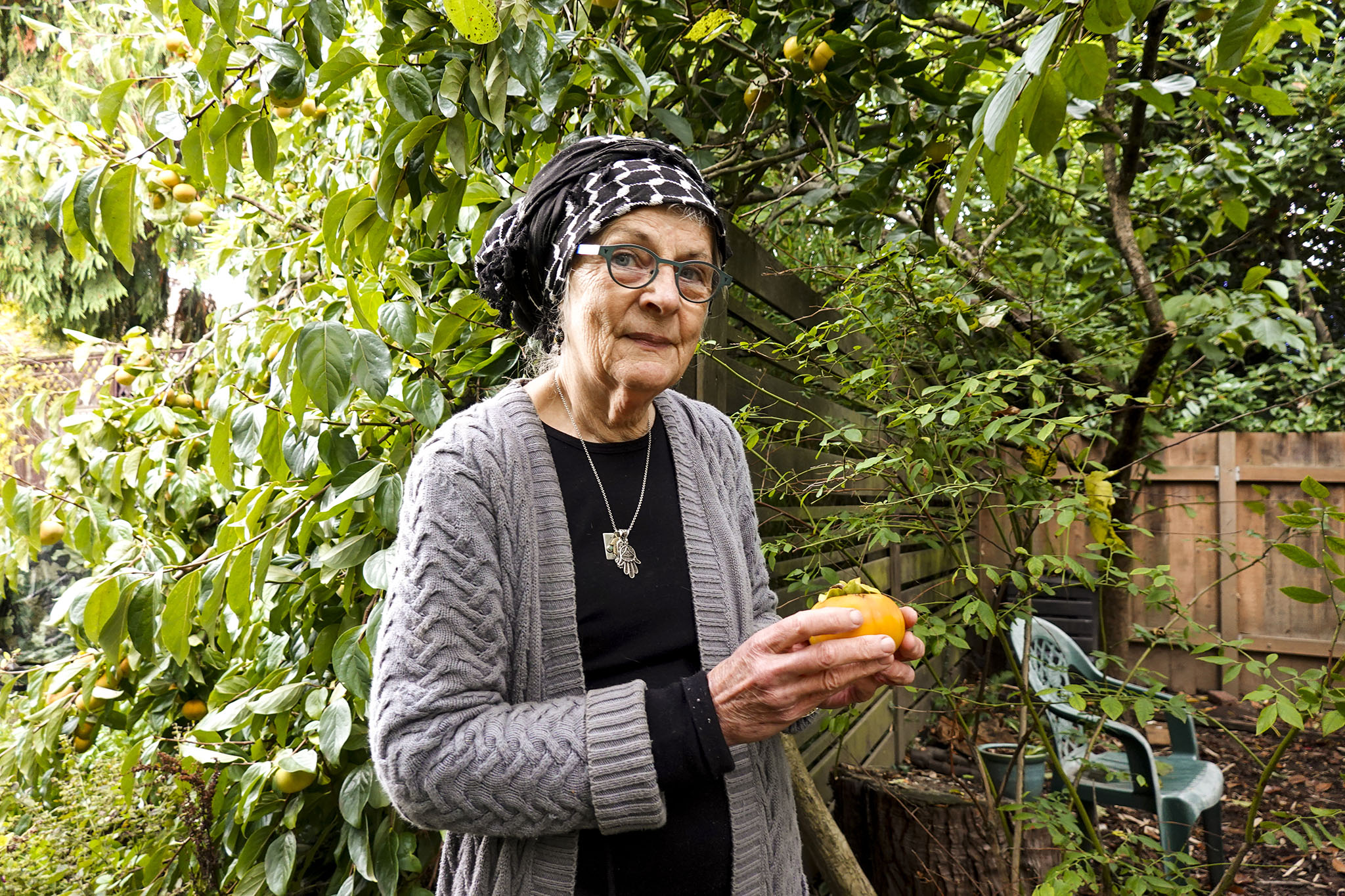
Pat Johnson stands in front of her persimmon tree in Portland, Ore., on October 23, 2023. The tree has grown into a neighbor’s yard, but Johnson has permission to pick from either side of the fence.
ELLA HUTCHERSON / NEXTGENRADIO
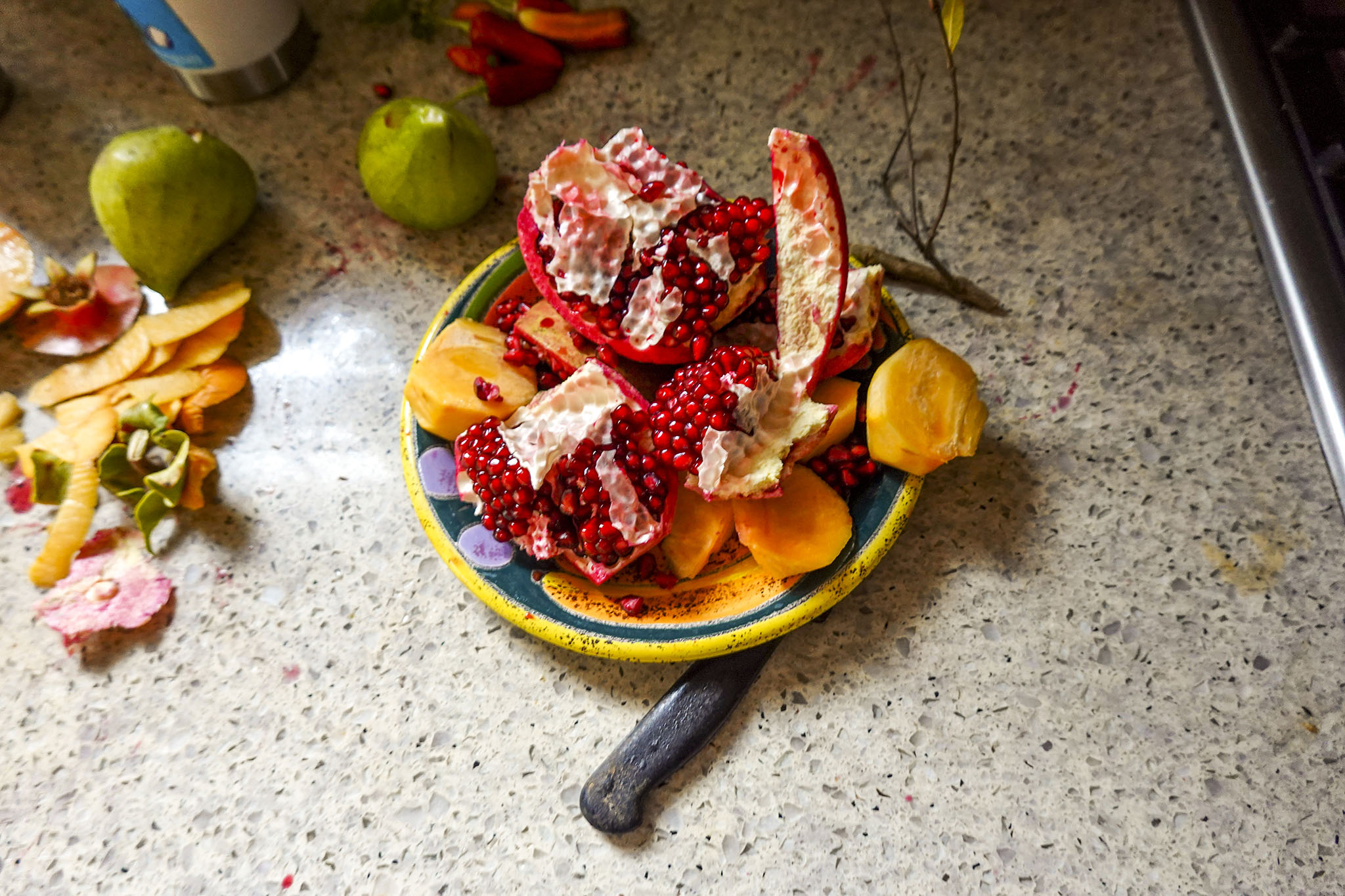
A pomegranate and persimmons sit on a plate on the counter in Pat Johnson’s kitchen on October 23, 2023. Johnson used to make cakes with persimmons for her daughter’s birthday, though she says her daughter would have preferred chocolate.
ELLA HUTCHERSON / NEXTGENRADIO
Pat Johnson walks down the steps to her front yard, where a fig tree she planted about seven years ago now towers over her. Branches filled with juicy green figs, orange persimmons and bright yellow quinces surround her house in northeast Portland. Reaching up into the high branches, she plucks a piece of fruit, heavy with ripeness, and cradles it in her hands. She’ll often come out here to pick figs for her breakfast.
Johnson moved to Portland after she retired from the Foreign Service in May 2008.
“I’ve never lived in one place so long my entire life,” she says. “But you make life outside of the building. Living in a place doesn’t really mean home.”
Born and raised in Iowa, Johnson, who is now 80, has roots all over the world. She has also lived in India, Turkey, Egypt, Yemen, Ecuador, Pakistan, Ethiopia and Sudan. She moved around mostly while working for the United States Foreign Service. She worked mainly as a consular officer, where she dealt with visas, passports and visitations to Americans arrested abroad. However, her journey began long before her diplomatic career.
In 1964, shortly before turning 21, Johnson went to India as part of the Fulbright Program. Though her mother didn’t want her to go, Johnson says it was one of the most exciting things she’s done.
“It was a real separation,” she says. “That sort of forced me to find my own way there and make my own decisions, because I wasn’t going to be consulting with anybody. I was doing it myself.”
After spending a year working at a college in the state of Punjab, she taught at a secondary school in Ethiopia. There she got married and had her first child. She and her family moved to Monmouth, Oregon, then Istanbul, where she had two more children.
Almost everywhere she lived, Johnson acquired a tree from a local nursery. The tradition began in 1965, when she planted a papaya tree in Ethiopia.
Her first assignment for the foreign service in 1985 took her back to Turkey. There she planted a pine tree, “because we wanted a Christmas tree and the only way you could get a Christmas tree then was to buy a live tree.”
Johnson also grew a palm in Yemen, a curry leaf in Pakistan, and avocado and guava trees in Sudan, among others. Her last assignment was in Ethiopia, where she planted a podocarpus tree.
While serving as a foreign service officer, Johnson moved every two or three years. She says she cried each time she left a location, because it had become a home — mostly because of the connections she had made and rituals she had adopted.
“You make community around you, and they become part of your family,” Johnson says.
She regularly hosted Thanksgiving dinners and invited the local friends she’d made. She says she still visits friends from Turkey. In 2015, she attended the wedding of a family she’d become connected to while in India for her Fulbright 50 years prior.
“I have friends in Toronto that I knew in Pakistan and India and Ethiopia. So I started to consider Toronto a bit of a home, even though I’ve never been there.”
Over the years, Johnson also collected items that hold sentimental value. When switching job placements, she was able to select 200 pounds of belongings she could take with her for her next assignment.
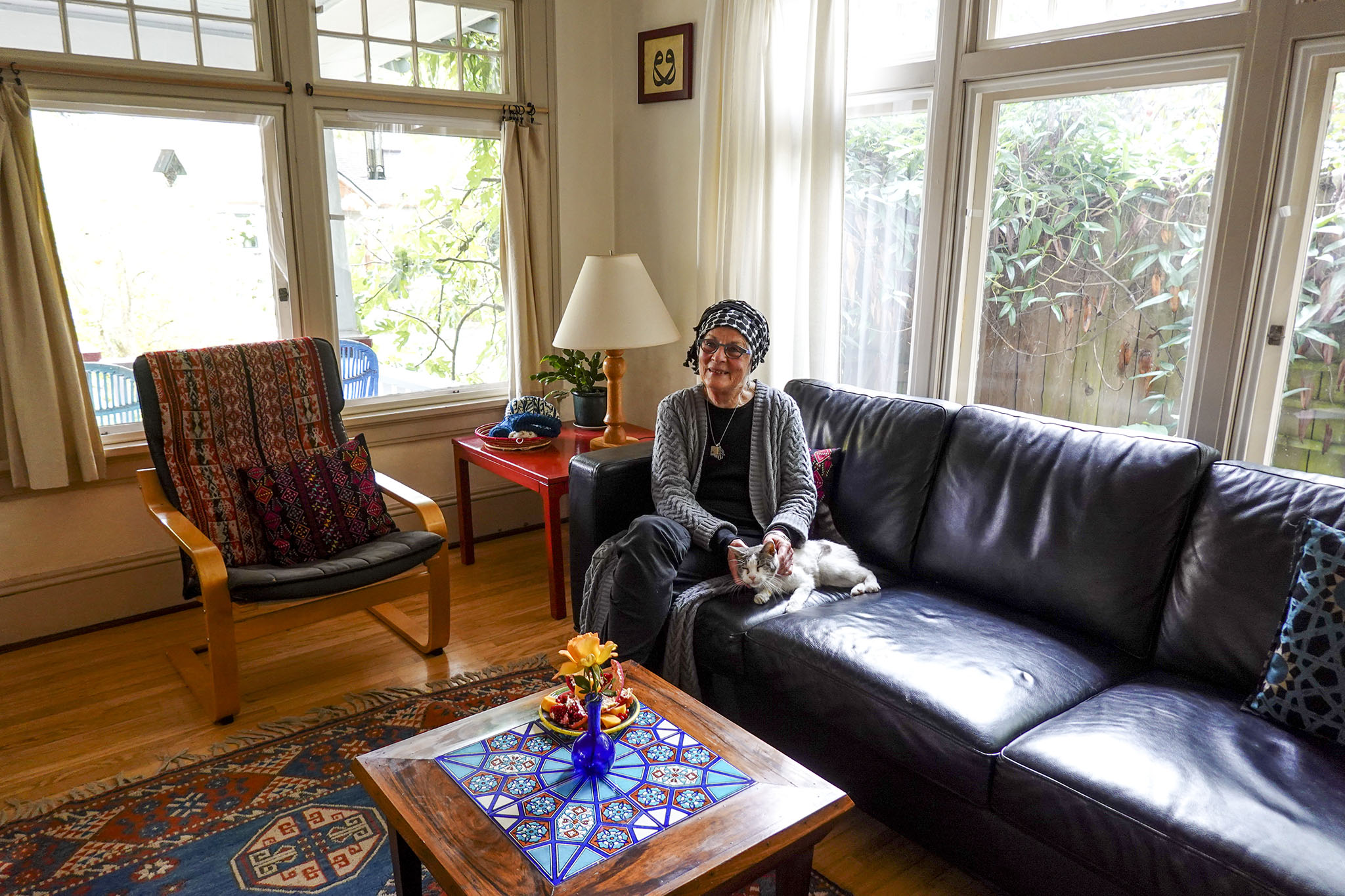
Pat Johnson sits in her living room with one of her cats, Badem, on October 23, 2023. Many items in her home have been gathered during her time in other countries, like a table from India and a rug from Turkey.
ELLA HUTCHERSON / NEXTGENRADIO
I’ve never lived in one place so long my entire life. But you make life outside of the building. Living in a place doesn’t really mean home.
A small metal container full of vibrant flowers sits on Johnson’s mantel. She got the hookah vase in 1965 at a bazaar in New Delhi.
“I always managed to pick things that I thought were sort of representative of what I had done in the past and what I’d picked up there,” Johnson says. “So I had these things that I was always bringing with me. Little things.”
The canopy of fruit trees enveloping her Portland house bear the same fruits that grew in countries she’s lived in all over the world. But Johnson says that, even if you plant trees, a house is not a home.
“Home is where I am,” Johnson says. “And all the people around me.”
She feels very connected to her global community and continues to travel. She’s planning for an upcoming trip to the south of India with one of her granddaughters, where she hopes to swim in the Indian Ocean — though it will be monsoon season.
“I’ve managed to go back to places with my children and now my grandchildren, to sort of tie them with experiences I’ve had,” Johnson says.“That’s part of home, isn’t it — getting people to share your experiences with you.”
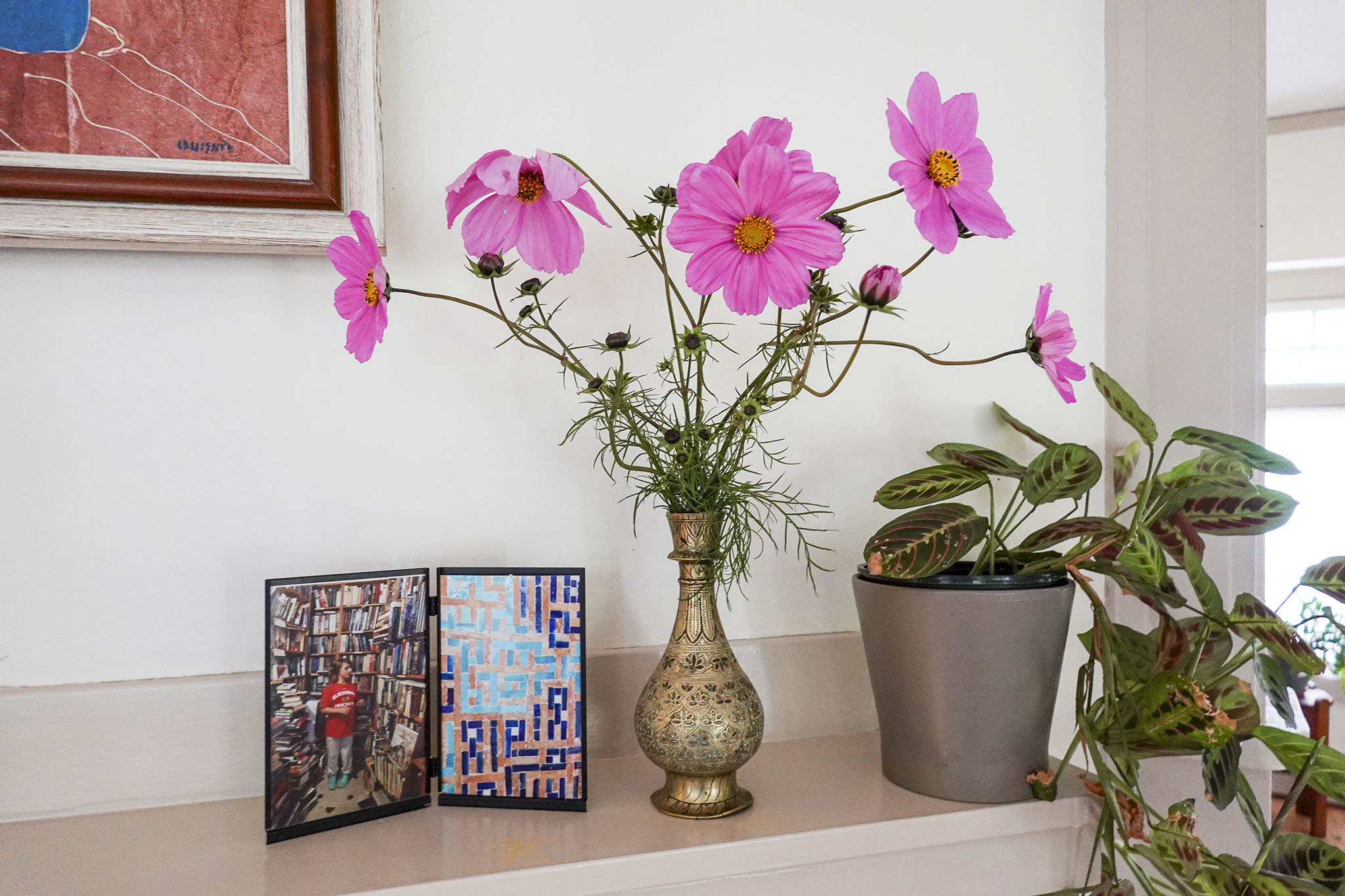
On Pat Johnson’s mantel sits a hookah vase that she got while in New Delhi, India, in 1965. She held onto items like this one to remind her of the other regions she’s called home.
ELLA HUTCHERSON / NEXTGENRADIO
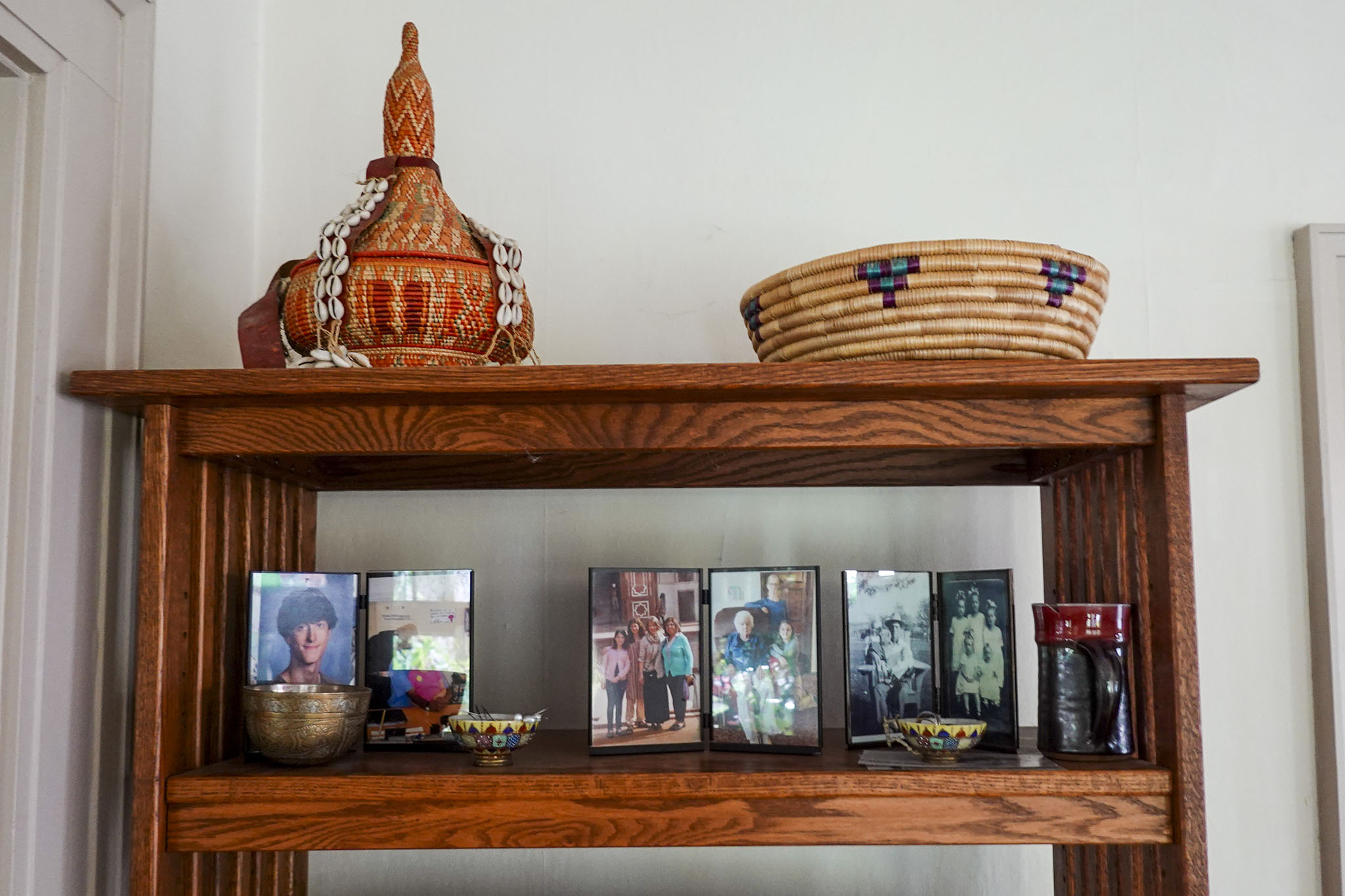
A shelf in Pat Johnson’s home is filled with photos of her family. Johnson continues to travel with her children and grandchildren. “I learn from them, they learn from me,” she says.
ELLA HUTCHERSON / NEXTGENRADIO
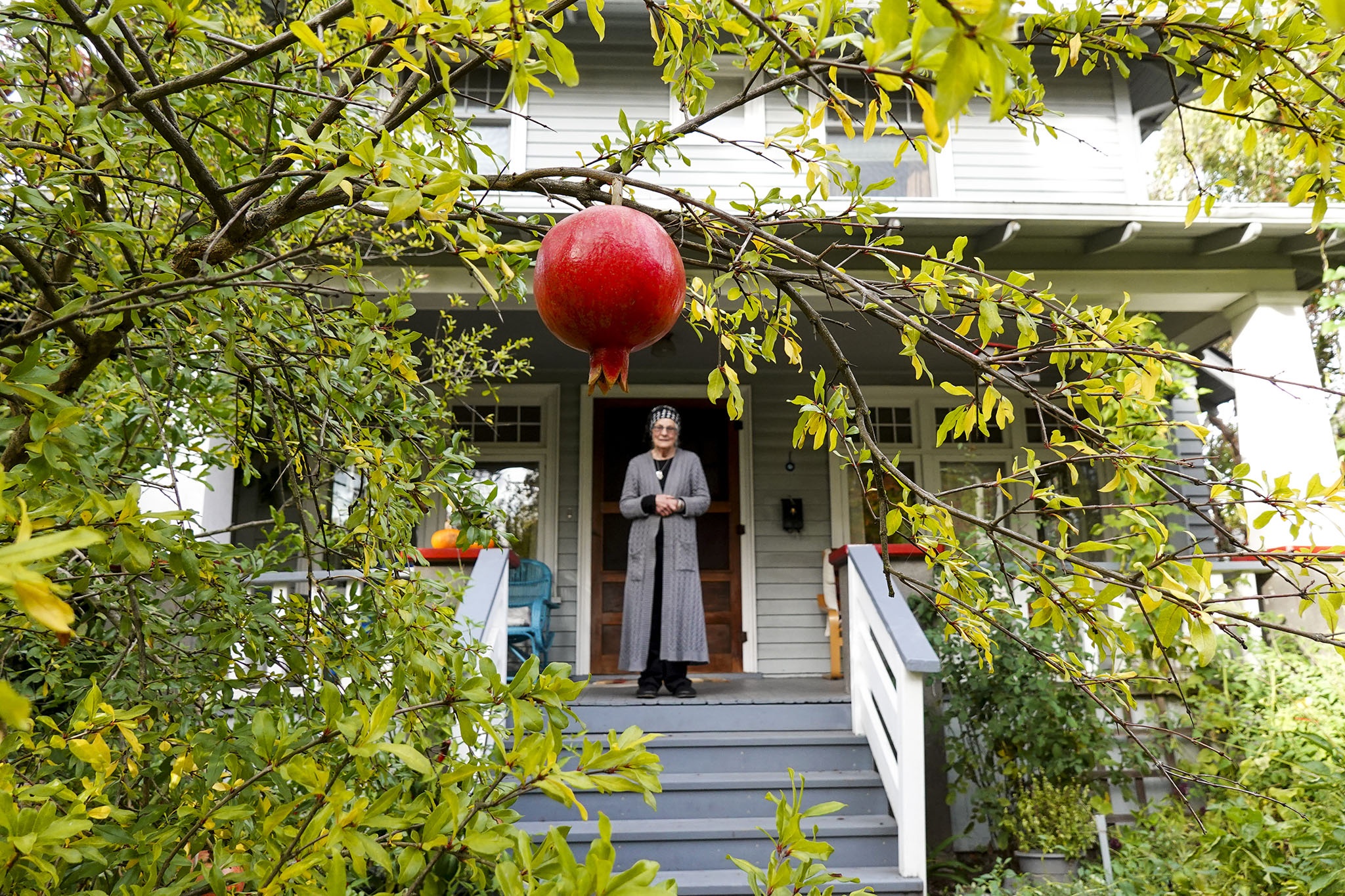
Pat Johnson stands outside her house in northeast Portland. In front of her hangs her pomegranate tree, which also grows in Turkey, Ethiopia and Pakistan — all countries she once lived in.
ELLA HUTCHERSON / NEXTGENRADIO
